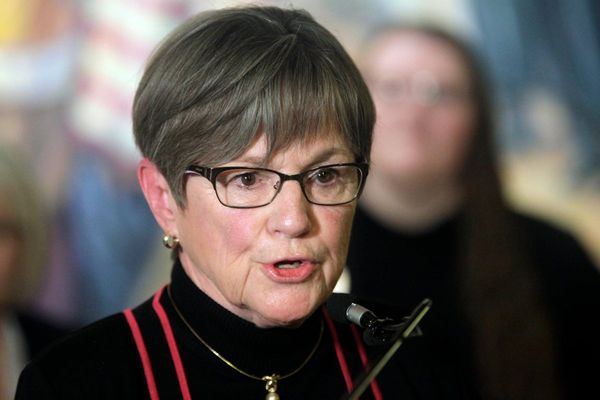Bangarra Dance Theatre's artistic director of 30 years, Stephen Page, has announced he is stepping down from the role — and passing the torch to former Bangarra dancer, choreographer and current associate artistic director Frances Rings.
WARNING: Aboriginal and Torres Strait Islander readers are advised this article contains images of people who have died.
The news follows the announcement on Friday of Bangarra's 2022 season, which will feature Page's most ambitious and personal work to date, Wudjang: Not The Past, and a 10th-anniversary remount of Rings's iconic work Terrain.
It will be Page's last year leading the company he took the helm of in 1991, at the age of 24.
At 55, he says the decision to step down was a matter of instinct.
"It just felt right. I felt like I had space around me and I could see [with] clarity. And I looked at Fran, and you just know … I go on my instinct."
Page leaves at a high point in the company's history: In 2018, his ambitious and critically acclaimed work Bennelong swept the Helpmann Awards, winning six— including Best New Australian Work and Best Choreographer; in 2019, the company celebrated its 30th anniversary with an exhibition, the launch of an online archive, and the retrospective program 30 years of Sixty Five Thousand.
And in 2020, the documentary Firestarter: The Story of Bangarra had its world premiere as part of the Brisbane International Film Festival.
It's been a chance to take stock of three decades in which Bangarra has gone from strength to strength, growing in size, artistic accolades and in the scope of its touring, educational and development programs — largely fuelled by Page's indefatigable leadership.
"It's a really, really good time for the company," he says.
"And it couldn't be in better hands [with Frances]."
The company has weathered significant trauma in the past two decades, with the deaths of Page's brothers and fellow collaborators Russell (a lead dancer) in 2002, and David (longstanding musical director) in 2016 — both by suicide.
In the aftermath, Page threw himself headlong into his work: "I felt creating and cleansing through that was the best thing I could have done," he says in Firestarter.
He also reflects frankly on the toll it took on him and the company.
In a reflective moment in the film, sitting on Munaldjali country in the Beaudesert area of Queensland, where his father was born, he says: "I haven't grieved at all for Rusty or David properly."
"Bangarra's had to put up with those suicides. The dancers had to put up with it … there was a lot of unfinished business that we had to do if we wanted to move on, and that's what I've been working on since David passed."
From student to muse to cultural leader
Frances Rings, an Adelaide-born woman of Kokatha and German descent, joined Bangarra in 1993, fresh out of NAISDA Dance College — where Page had taught her choreography.
Over the next decade she developed her dance craft, becoming a muse for Page and literal "poster girl" for Bangarra, alongside younger Page brother Russell.
Off stage, she hosted SBS's weekly Indigenous current affairs program ICAM, and honed her choreographic skills, making her mainstage debut in 2002 with Rations, part of the Helpmann Award-winning double bill Walkabout (alongside Page's work Rush).
In 2004 she was appointed associate artistic director for a brief spell, before leaving in 2005 to freelance as a choreographer (for the West Australian Ballet and TasDance, among others).
In 2010, she returned to take up the role of resident choreographer (leading to her acclaimed 2012 work Terrain), but in 2015, she left Bangarra once again, to take up a post at NAISDA, as head of creative studies.
"It was really important for me to just move away from Bangarra for a while to learn other skills and to oversee the curriculum at a dance college that the majority of our dancers come from," she says.
Page says: "I feel like she has had that wonderful journey from being a student, to falling into the shape of a dancer, and then learning this beautiful craft of telling stories. And then now, the skills of leading the company to the future."
Rings will assume the role in 2023 at a time of unprecedented female leadership for the company, joining executive director Lissa Twomey and board chair Phillipa McDermott.
She is one of a handful of women leading major performing arts companies in Australia.
"I think that women see the world differently, they have different ways of leadership, of holding space, that really allows others to contribute; to be a part of a clan, of an organisation, that's moving forward and exploring different things," she says.
She's keen to experiment with multidisciplinary forms and to collaborate with other First Nations companies, expanding on her existing relationships with Toronto's Kahawi Dance Theatre and Atamira Dance Company in Auckland, Aotearoa (New Zealand), as well as forging new ones.
She admits to being daunted by the inheritance of Bangarra's sizable legacy, as Australia's longest-running First Nations major performing arts company — and the only full-time First Nations dance company in the world.
"It's been extremely overwhelming in a lot of ways to know that history and that legacy, and then having that passed on to me," she says.
"I inherit this incredible legacy, this cultural foundation, that Stephen has put so much energy and incredible hard work [into], along with sacrifices."
"You know, the man is a cultural force."
But she's quick to point out that he's not going far — which Page confirms.
"I'm just going to take a break. But you know, Frances is already bouncing ideas with me for a work in 2023. And I'm going to be like this little sacred mentor for her in the corner that she can [ask for advice]," he jokes.
"I think the main thing is, what we're talking about here is this beautiful, natural, fluid transition, of passing this message stick down, and we all know now that it's (Bangarra) in great hands.
"And the fact that it's a Black Kokatha woman, a First Nations woman — that's even more exciting."
Bangarra 2022
Perhaps appropriately, 2022 will open with Page's most ambitious and most personal work to date: Wudjang — a collaboration with Sydney Theatre Company directed and choreographed by Page, that will premiere at Sydney Festival in January.
Set on Yugambeh country, the story starts with the discovery of bones by workmen; they belong to Wudjang, an ancestor who wants to be reburied the proper way.
The script, co-written by Page with playwright Alana Valentine, interweaves English language with poetry and song in Mibinyah, the ancestral language of Page's father Roy, and Bangarra's trademark fusion of contemporary and cultural dance.
The production will feature a cast of 17 actors, singers and musicians — including Elaine Crombie (Black Comedy; The 7 Stages of Grieving) and longtime company member Elma Kris.
In June, Bangarra will remount their Helpmann Award-winning production Terrain, Rings's first full-length choreographic commission for the company, celebrating its 10th anniversary in 2022.
Terrain will open at Sydney Opera House, followed by seasons in Canberra and Brisbane.
The company's 2022 season will close with a collaboration between the outgoing and incoming artistic directors: Sandsong, created in consultation with Wangkajunga/Walmajarri elders from the Kimberley and Great Sandy Desert regions.
Sandsong will open at Sydney Opera House in June, where it was forced to close mid-season this year due to lockdown. It will then tour to Melbourne and Bendigo.







